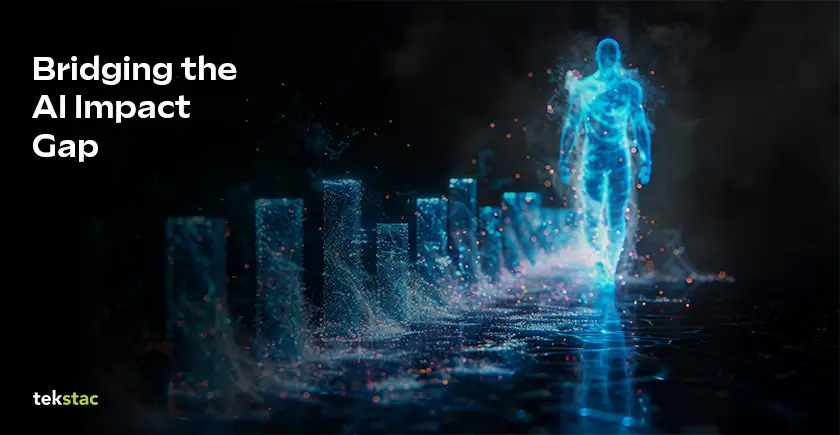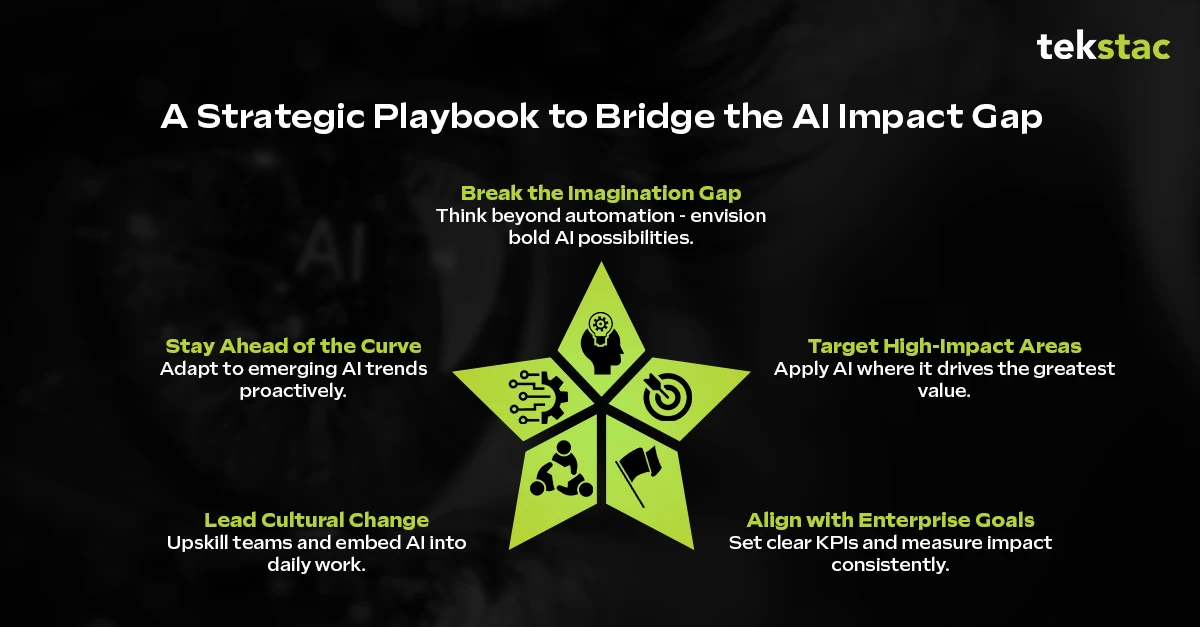Closing the AI Impact Gap: Why Most AI Investments Fail to Deliver ROI
May 7, 2025

Last updated on February 11th, 2026
The world is racing toward an AI-powered future, with businesses investing heavily in artificial intelligence. Yet, despite grand ambitions, many companies struggle to turn AI potential into real business impact — a disconnect increasingly known as the AI impact gap. The latest BCG AI Radar 2025 report reveals a stark contrast between AI investments and actual value realization. With AI spending projected to surge by 60% in the next three years, the question remains: How can organizations bridge the AI impact gap?
What Is the AI Impact Gap?
The AI impact gap refers to the disconnect between AI investment and measurable business value. While companies spend heavily on artificial intelligence, many fail to translate pilot projects into scalable, revenue-generating outcomes.
Why the AI Investment Boom Isn’t Closing the AI Impact Gap
One in three companies globally is planning to invest over $25 million in AI in 2026. While AI and GenAI rank among the top three strategic priorities for 75% of executives, only 25% are witnessing significant returns. The challenge lies not in the technology itself but in how it is deployed, scaled, and integrated into everyday business operations.
What Separates AI Leaders from Companies Struggling with the AI Impact Gap
Leading organizations approach AI differently. Instead of scattering their investments across multiple pilots with diluted impact, they focus on three strategic plays:
- Embedding AI into Everyday Workflows – By deploying AI in routine tasks, businesses unlock 10-20% productivity gains.
- Reshaping Critical Functions – AI-driven process enhancements boost efficiency and effectiveness by 30-50%.
- Inventing New Products and Services – This strategy drives innovation and long-term competitive advantage.
While most companies allocate only 27% of their AI budget to high-impact initiatives, leading firms dedicate over 80% to reshaping functions and driving innovation.
The Data Dilemma: Why Poor KPI Tracking Widens the AI Impact Gap
Surprisingly, 60% of companies fail to track financial KPIs linked to AI investments. Without clear performance metrics, organizations risk losing sight of AI’s bottom-line impact. Leading firms, on the other hand, adopt a disciplined approach, defining goals, measuring top- and bottom-line results, and continuously refining their AI strategies.
The Data Dilemma: Why Poor KPI Tracking Widens the AI Impact Gap
AI success isn’t just about algorithms, it’s about people and processes. The best-performing companies follow the 10-20-70 principle:
- 10% of AI success comes from cutting-edge algorithms.
- 20% is driven by robust technology infrastructure.
- 70% depends on people, culture, and process transformation.
Despite the rise of AI, only 6% of companies have trained over 25% of their workforce in AI tools. Without widespread AI upskilling, businesses will struggle to fully capitalize on their investments.
AI Governance and Risk Management in the Age of Enterprise AI
While AI promises efficiency and innovation, it also brings risks. The top concerns for executives include:
- Data privacy and security (66%)
- Lack of control over AI decisions (48%)
- Regulatory and compliance challenges (44%)
Cybersecurity remains a major weak spot, with 76% of executives acknowledging the need for stronger AI security measures. Companies that proactively address these risks will gain a competitive edge in trust and reliability.
The Rise of AI Agents: A New Frontier in Business Transformation
2026 marks the rise of AI agents, intelligent systems capable of learning, reasoning, and taking actions on behalf of users. While 67% of companies are exploring AI agents as part of their transformation strategy, true success lies in their thoughtful application. Leaders must avoid the hype, focus on targeted implementations, and ensure AI agents complement human capabilities rather than replace them.
How to Close the AI Impact Gap: A Strategic Playbook for Leaders
To bridge the AI impact gap, businesses must rethink their AI strategies. The most successful organizations maximize AI value by:

- Breaking through the imagination gap – Envisioning AI-driven transformation beyond incremental improvements.
- Targeting high-impact opportunities – Prioritizing core business functions that AI can enhance significantly.
- Aligning AI with enterprise goals – Setting clear KPIs and continuously tracking value creation.
- Leading cultural and organizational change – Empowering employees through AI upskilling and change management.
- Preparing for the next AI wave – Anticipating emerging AI trends and proactively adapting strategies.
The future belongs to those who can not only invest in AI but also extract real value from it. The time to act is now, before the AI impact gap widens further.
Based on insights from the BCG AI Radar 2025 report.





